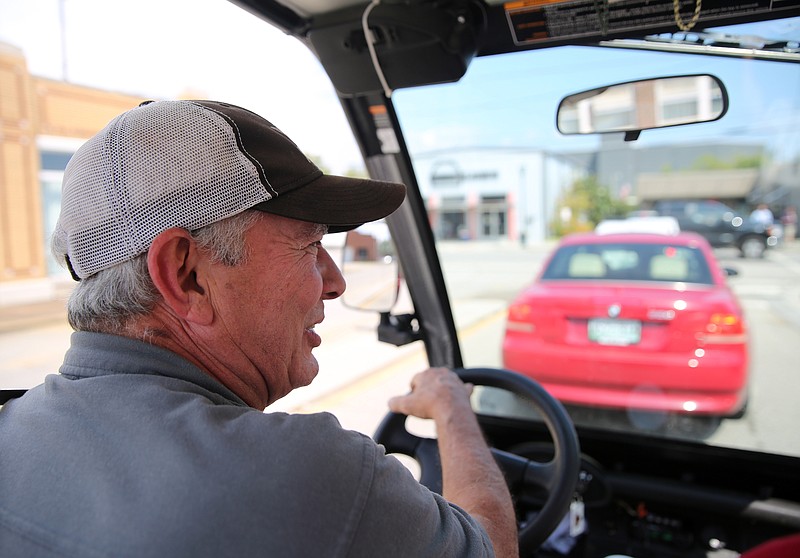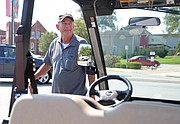Like a lot of couples, Shannon and Joe "Dixie" Fuller were creatures of habit while living with his mother in a big house in Red Bank. They worked, went home, plopped on the couch, watched a little TV and went to bed. Rinse and repeat.
Shortly after his mother passed away in 2015, the Fullers built a new 825-square-foot living space right next door to Zarzour's, the restaurant that Shannon runs and that has been in Dixie's family for 99 years. Both say they have loved being on the city's Southside with so much activity around them, but the real lifestyle change for them came after Dixie, 61, took possession of a golf cart from Chattanooga Golf Carts.
The acquisition has been life-changing for both.
"When I moved into the house in Red Bank, I didn't leave or go out for 20 years," says Shannon. 52.
Since getting the cart back in June during the Riverbend Festival, for which Dixie books the talent and oversees the production, the couple started hopping onto the electric-powered, street-legal cart and scooting over to catch a Nightfall show, or they would make the two-block trek to the Chattanooga Choo Choo for a Second Saturdays on Station Street block party.
Shannon uses the cart to run errands and for just about any other excuse she can think of.
"I love it," she says.
Or, if the mood strikes, they'll now drive over to the riverfront area for dinner.
Golf carts are legally defined as motorized vehicles by the city, according to Transportation Deputy Administrator Lezlie Rupert, and therefore need to follow the same laws as a car or truck. This includes parking at meters and driving in the car lane and not in the bike lane or on the sidewalks.
But, because of the carts' size, the Fullers say finding parking is easier, and they can pretty much drive theirs right up to wherever they are going. The cart provides instant seating as well.
A recent Thursday morning finds Dixie Fuller zipping along at 20-25 mph through traffic along Broad and Market streets before heading back to Zarzour's to pick up a burger for delivery to Keeli Crewe at Area 61 art gallery on Main Street.
Along the way, he draws a lot of attention from drivers and pedestrians.
"Oh, I get lots of stares, and people stop and want to talk about it all the time," Fuller says. "Some of the restaurants ask me about using them for deliveries."
In fact, the Fullers plan to increase their lunchtime delivery options thanks to the golf cart, but "right now we are doing it for people we know if I'm here and available," Dixie says.
To say the golf cart has opened up a new world for them is an understatement, he says.
"Oh, gosh, it's just been so much fun. There are so many options now, and what's really great is that you see things you don't normally see. I've driven these same roads for years. Years. And I see things all the time that I've never noticed."
Craig Taylor is the owner of Chattanooga Golf Carts and T&T Golf Carts in Trenton, Ga. He says he hears that from cart owners all the time.
"People say, 'I see so many new things now'," he says.
Taylor has owned his Trenton store for 18 years and the Chattanooga location for about six. He says people primarily bought residential golf carts in the past to get around on their farms or larger rural properties.
"They'd drive the grandkids around or go down to the mailbox," he says.
They are becoming increasingly popular in cities, especially those with a revived downtown or larger residential areas where parking and traffic are issues. In places like Peachtree City in Georgia or The Villages in Florida, there are more carts than cars and life revolves around carts as transportation.
Today's golf carts, which Taylor says range in price from $4,000 to $9,000, can be outfitted with just about anything an automobile can, including doors, stereos, windshield wipers, heat and air. With the addition of turn signals, brake lights, head lights and seat belts, they are street legal as long as they can go at least 20 miles an hour.
They also can be customized.
"We just delivered two to the same person that were $23,000 each," Taylor says, describing them as commercial carts outfitted with ladder racks and full cabs.
With proper maintenance, which Taylor says involves little more than checking the water in the battery, the carts should last a lifetime. The battery packs, which go for around $600, need to be replaced about every five years.
The Fullers' 2Five E-2-60 will top out at 25 mph, and Dixie says he has no trouble climbing the hills around the Bluff View Art District area, and he can get from the Southside to the North Shore area in the same amount of time it would take in his truck. He says he now fills the larger vehicle up about once a month instead of once a week and spends maybe $5 on electricity to charge the cart, which plugs into a regular 110 outlet.
"That always surprises people," Taylor says.
Contact Barry Courter at bcourter@timesfreepress.com or 423-757-6354.

